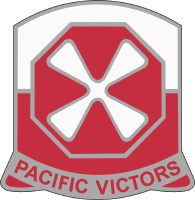Eighth United States Army
| Eighth Army | |
|---|---|

The Eighth Army's distinctive unit insignia
|
|
| Founded | January 10, 1944 |
| Country |
|
| Branch |
|
| Type | Field army |
| Role | Cadet services, unarmed&light infantry |
| Part of | Regular Army |
| Garrison/HQ |
Yongsan Army Garrison Yongsan District, Seoul, South Korea |
| Motto(s) | Pacific Victors |
| Engagements |
World War II Korean War |
| Commanders | |
| Current commander |
LTG Thomas S. Vandal |
| Notable commanders |
Robert Eichelberger Walton H. Walker Matthew Ridgway James Van Fleet |
| Insignia | |
| Combat service identification badge |  |
| Flag |  |
The Eighth United States Army (EUSA) is an American field army which is the commanding formation of all United States Army forces in South Korea. A task force of troops which are composed of personnel from the American-South Korean alliance, it is based at the Yongsan Army Garrison, located in the Yongsan District of Seoul, South Korea.
The unit first activated on 10 June 1944 in the United States, being commanded by Lieutenant General Robert Eichelberger. The Eighth Army took part in many of the amphibious landings in the Southwest Pacific Theater of World War II, eventually participating in no less than sixty of them. The first mission of the Eighth Army, in September 1944, was to take over from the U.S. Sixth Army in New Guinea, New Britain, the Admiralty Islands and on Morotai, in order to free up the Sixth Army to engage in the Philippines Campaign (1944–45).
The 8th Army again followed in the wake of the Sixth Army in December, 1944 when it took over control of operations on Leyte Island on 26 December. In January, the Eighth Army entered combat on Luzon, landing the XI Corps on 29 January near San Antonio and the 11th Airborne Division on the other side of Manila Bay two days later. Combining with I Corps and XIV Corps of Sixth Army, the forces of Eighth Army next enveloped Manila in a great double-pincer movement. Eighth Army's final operation of the Pacific War was that of clearing out the southern Philippines of the Japanese Army, including on the major island of Mindanao, an effort that occupied the soldiers of the Eighth Army for the rest of the war.
...
Wikipedia
